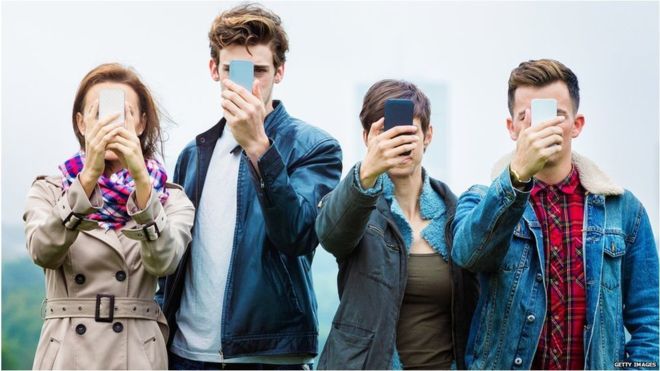Smartphone ‘Addiction’: Young People ‘Panicky’ when Denied Mobiles
TECHNOLOGY, 2 Dec 2019
Almost a quarter of young people are so dependent on their smartphones that it becomes like an addiction, suggests research by psychiatrists.
29 Nov 2019 – The study, from King’s College London, says such addictive behaviour means that people become “panicky” or “upset” if they are denied constant access.
The youngsters also cannot control the amount of time they spend on the phone.
The study warns that such addictions have “serious consequences” for mental health.
The research, published in BMC Psychiatry, analysed 41 studies involving 42,000 young people in an investigation into “problematic smartphone usage”.
The study found 23% had behaviour that was consistent with an addiction – such as anxiety over not being able to use their phone, not being able to moderate the time spent and using mobiles so much that it was detrimental to other activities.
‘Here to stay’
Such addictive behaviour could be linked to other problems, says the study, such as stress, a depressed mood, lack of sleep and reduced achievement in school.
“Smartphones are here to stay and there is a need to understand the prevalence of problematic smartphone usage,” says one of the report’s authors, Nicola Kalk, from the Institute of Psychiatry, Psychology and Neuroscience at King’s College London.
“We don’t know whether it is the smartphone itself that can be addictive or the apps that people use,” said Dr Kalk.
“Nevertheless, there is a need for public awareness around smartphone use in children and young people, and parents should be aware of how much time their children spend on their phones.”
Co-author Samantha Sohn warned that addictions “can have serious consequences on mental health and day-to-day functioning, so there is a need for further investigation into problematic smartphone usage”.
But Amy Orben, research fellow at the MRC Cognition and Brain Sciences Unit at the University of Cambridge, warned against assuming there were causal connections between problematic smartphone use and outcomes such as depression.
“It has been shown previously that smartphone effects are not a one-way street, but that mood can impact the amount of smartphone use, as well,” said Dr Orben.
Tags: Addiction, Big tech, Cellphones, Media, Mental Health, Public Health, Smartphones, Social media, Telecommunication
DISCLAIMER: The statements, views and opinions expressed in pieces republished here are solely those of the authors and do not necessarily represent those of TMS. In accordance with title 17 U.S.C. section 107, this material is distributed without profit to those who have expressed a prior interest in receiving the included information for research and educational purposes. TMS has no affiliation whatsoever with the originator of this article nor is TMS endorsed or sponsored by the originator. “GO TO ORIGINAL” links are provided as a convenience to our readers and allow for verification of authenticity. However, as originating pages are often updated by their originating host sites, the versions posted may not match the versions our readers view when clicking the “GO TO ORIGINAL” links. This site contains copyrighted material the use of which has not always been specifically authorized by the copyright owner. We are making such material available in our efforts to advance understanding of environmental, political, human rights, economic, democracy, scientific, and social justice issues, etc. We believe this constitutes a ‘fair use’ of any such copyrighted material as provided for in section 107 of the US Copyright Law. In accordance with Title 17 U.S.C. Section 107, the material on this site is distributed without profit to those who have expressed a prior interest in receiving the included information for research and educational purposes. For more information go to: http://www.law.cornell.edu/uscode/17/107.shtml. If you wish to use copyrighted material from this site for purposes of your own that go beyond ‘fair use’, you must obtain permission from the copyright owner.
